Understanding Economic Behaviour
Samenvatting
may be related to another basic assumption in economic psychology: that the human capacity to process information from the environment is limited, and that the kind of optimal use of that information postulated in many economic theories is therefore not possible. The research methods used are mainly geared towards empirical research, and there mostly towards survey research and experimentation. Experimentation involves most often simulated behaviour in a laboratory, which allows the experimental manipulation of possible causes of behaviour which would not be possible in real life. Survey research is the most widely used instrument for investigating real-world behaviour, with all its caveats about establishing causal explanations. Several introductory books (e. g. , Fumham & Lewis, 1986; Lea, Tarpy, & Webley, 1987; van Raaij, van Veldhoven, & Wlimeryd, 1988) and articles (e. g. , van Raaij, 1979; Wiswede, 1988) have appeared recently, which try to give an overview of the field of economic psychology, and which, in varying degrees, demonstrate the three foundations of economic psychology just mentioned. Others have concentrated on certain subtopics, such as the psychology of the labour market (e. g. , Baxter, 1988; Pelzmann, 1986).
Specificaties
Inhoudsopgave
Anderen die dit kochten, kochten ook
Net verschenen
Rubrieken
- aanbestedingsrecht
- aansprakelijkheids- en verzekeringsrecht
- accountancy
- algemeen juridisch
- arbeidsrecht
- bank- en effectenrecht
- bestuursrecht
- bouwrecht
- burgerlijk recht en procesrecht
- europees-internationaal recht
- fiscaal recht
- gezondheidsrecht
- insolventierecht
- intellectuele eigendom en ict-recht
- management
- mens en maatschappij
- milieu- en omgevingsrecht
- notarieel recht
- ondernemingsrecht
- pensioenrecht
- personen- en familierecht
- sociale zekerheidsrecht
- staatsrecht
- strafrecht en criminologie
- vastgoed- en huurrecht
- vreemdelingenrecht







